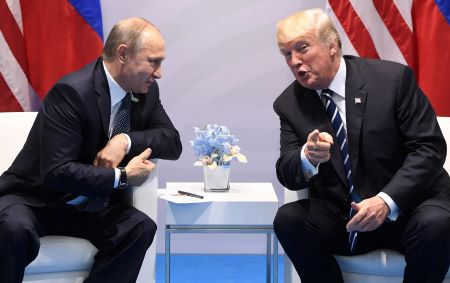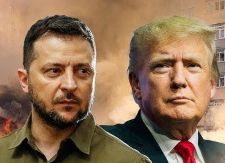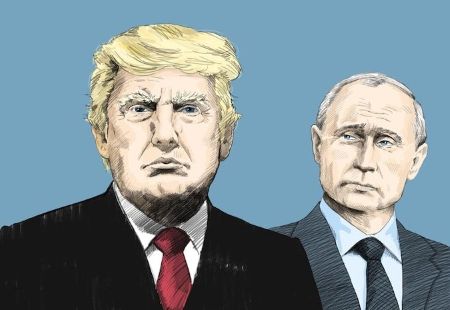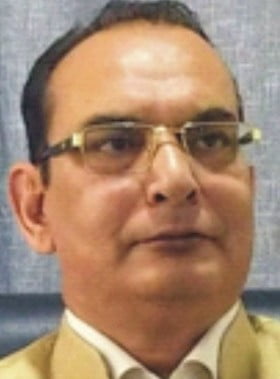Amid promises, threats, and diplomacy, Trump’s approach raises hopes and questions about the future of the Russia-Ukraine conflict.
IT SEEMS THAT the three-year-old Russia-Ukraine war might finally end following U.S. President Donald Trump’s pompous intervention. Russian President Vladimir Putin has adopted a noticeably conciliatory tone, downplaying Trump’s economic threats, while Trump squarely blames Ukrainian President Volodymyr Zelensky for starting the conflict.
During his election campaign, just as he achieved the Gaza ceasefire before his inauguration, Trump also promised to end the Russia-Ukraine war within 100 days of assuming the U.S. presidency.
 Curiously, within days of Trump being inaugurated as the 47th U.S. president, Russian President Vladimir Putin expressed readiness to discuss the war in Ukraine with him and suggested an in-person meeting.
Curiously, within days of Trump being inaugurated as the 47th U.S. president, Russian President Vladimir Putin expressed readiness to discuss the war in Ukraine with him and suggested an in-person meeting.
In his first remarks following Trump’s threats to impose economic sanctions if Russia failed to end the war, Putin struck a favorable tone towards the U.S. president.
Both leaders have stated their willingness to meet for talks on Ukraine. Trump has threatened Russia with harsher economic sanctions if Moscow refuses to agree to end the conflict.
Putin told a Russian state TV journalist: “We believe the current president’s statements about his readiness to work together. We are always open to this and ready for negotiations. It would be better for us to meet, based on the realities of today, to talk calmly.”
He described his relationship with Trump as “businesslike, pragmatic, and trustworthy.” However, he added that negotiations with Ukraine were complicated by President Zelensky’s decree preventing talks with Putin.
In an apparent effort to cozy up to Trump, Putin echoed the U.S. president’s claim that he could have prevented the war from starting in 2022. Putin even supported Trump’s discredited assertion that the 2020 U.S. elections were “stolen” from him.
Economic Sanctions Against Russia
Trump’s attempts to persuade Putin to negotiate have been reinforced by threats to escalate economic pressure on Russia. These include new sanctions and tariffs if Moscow fails to “make a deal” to end the war.
Speaking virtually at the World Economic Forum in Davos on Thursday (January 23), Trump urged OPEC+ to lower global oil prices, aiming to hit one of the Kremlin’s vital revenue streams. “Right now, the price is high enough that the war will continue,” he said.
 Oil and gas revenues have been Russia’s most important source of cash, accounting for a significant portion of federal budget proceeds over the past decade.
Oil and gas revenues have been Russia’s most important source of cash, accounting for a significant portion of federal budget proceeds over the past decade.
While Trump has yet to present a detailed blueprint for ending the war, his running mate, J.D. Vance, has suggested the creation of a “heavily fortified” demilitarized zone at the countries’ borders, effectively freezing the war along current frontlines.
Trump’s return to the White House has also reignited discussions about deploying Western peacekeeping forces in Ukraine to help maintain a ceasefire. However, the Russian Foreign Ministry has called this idea “unacceptable,” while also rejecting calls to freeze the conflict along the frontlines.
Trump’s Soothing Approach
This week, Trump appeared to adopt a tone aimed at soothing Moscow. In an interview with Fox News on Thursday (January 22), he described President Zelensky as “no angel,” suggesting that the Ukrainian leader bore some responsibility for the war’s outbreak. “He shouldn’t have allowed this war to happen,” Trump said.
 In his nightly video address on Friday (January 24), Zelensky accused Putin of trying to manipulate Trump. “He is attempting to exploit the U.S. president’s desire to achieve peace. I am confident that no Russian manipulations will succeed any longer,” Zelensky said.
In his nightly video address on Friday (January 24), Zelensky accused Putin of trying to manipulate Trump. “He is attempting to exploit the U.S. president’s desire to achieve peace. I am confident that no Russian manipulations will succeed any longer,” Zelensky said.
Kremlin’s Response
Kremlin spokesman Dmitry Peskov told journalists: “Putin is ready. We are waiting for signals from the United States.”
 Peskov declined to comment further on a potential meeting between the leaders, saying it was “hard to read coffee grounds” to predict the future. He also dismissed Trump’s claim that the conflict in Ukraine could be resolved by lowering the price of Russian oil, stating, “This conflict does not depend on oil prices.”
Peskov declined to comment further on a potential meeting between the leaders, saying it was “hard to read coffee grounds” to predict the future. He also dismissed Trump’s claim that the conflict in Ukraine could be resolved by lowering the price of Russian oil, stating, “This conflict does not depend on oil prices.”
Peskov emphasized that the conflict stemmed from “threats to Russia’s national security,” “threats to Russians living in Ukraine,” and the “lack of desire and complete refusal of Americans and Europeans to listen to Russia’s concerns.”
OPEC’s Role
Trump, who campaigned on a promise to swiftly end the conflict, is focusing on leveraging OPEC+, the coalition of oil-producing nations, by urging them to reduce oil prices to pressure Russia. He believes that lowering oil prices could force Putin to reconsider the war.
However, industry experts caution that pressuring OPEC+ could be challenging. The group has already postponed increasing oil production due to weaker demand and competition from non-member countries.
Trump’s Broader Strategy
Trump has framed his approach to the Ukraine conflict in economic terms, arguing that leveraging financial pressure on Russia could force Putin to negotiate. While former President Joe Biden adopted a similar strategy, it was met with resistance from Saudi Arabia, and Trump faces similar challenges in navigating OPEC+ dynamics.
 Trump’s bold strategy highlights his preference for using economic leverage—particularly targeting oil—over military intervention to resolve global conflicts. This approach contrasts sharply with traditional military strategies, except in cases involving allies like Israel.
Trump’s bold strategy highlights his preference for using economic leverage—particularly targeting oil—over military intervention to resolve global conflicts. This approach contrasts sharply with traditional military strategies, except in cases involving allies like Israel.
Domestically, Trump’s focus on reducing oil prices could also benefit American consumers by lowering inflation and reducing public dissatisfaction with his policies. Lower prices for goods and personal finance costs could bolster Trump’s support among voters. ![]()
Also Read: Gaza Ceasefire: A Victory for Biden or Trump?
Disclaimer : PunjabTodayNews.com and other platforms of the Punjab Today group strive to include views and opinions from across the entire spectrum, but by no means do we agree with everything we publish. Our efforts and editorial choices consistently underscore our authors’ right to the freedom of speech. However, it should be clear to all readers that individual authors are responsible for the information, ideas or opinions in their articles, and very often, these do not reflect the views of PunjabTodayNews.com or other platforms of the group. Punjab Today does not assume any responsibility or liability for the views of authors whose work appears here.
Punjab Today believes in serious, engaging, narrative journalism at a time when mainstream media houses seem to have given up on long-form writing and news television has blurred or altogether erased the lines between news and slapstick entertainment. We at Punjab Today believe that readers such as yourself appreciate cerebral journalism, and would like you to hold us against the best international industry standards. Brickbats are welcome even more than bouquets, though an occasional pat on the back is always encouraging. Good journalism can be a lifeline in these uncertain times worldwide. You can support us in myriad ways. To begin with, by spreading word about us and forwarding this reportage. Stay engaged.
— Team PT

